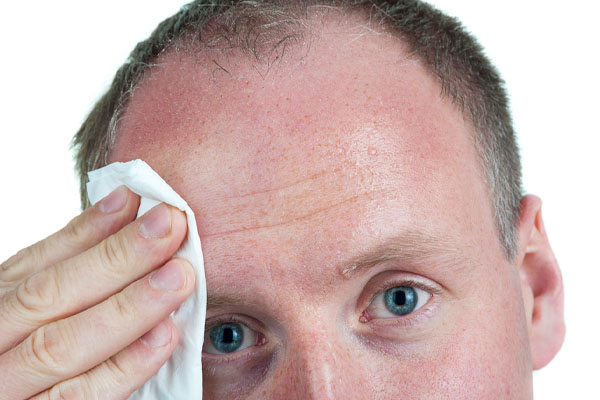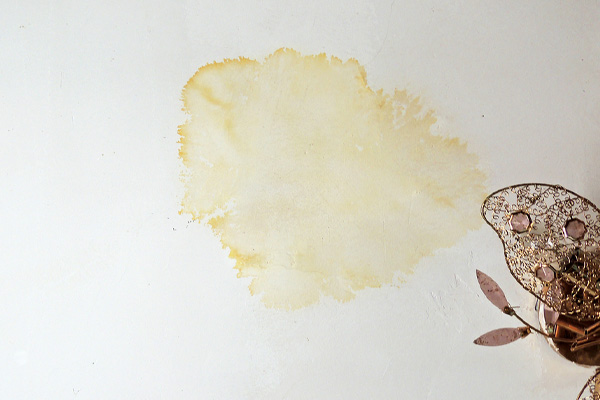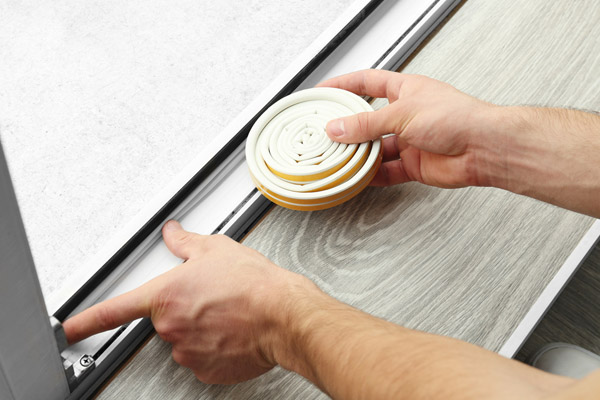Why Is My House So Humid?

Home comfort goes beyond indoor temperature. Families should consider other factors like humidity, as well. It is defined as the amount of moisture in the air. If humidity rises much higher than the ideal range, then people may start to see and feel negative effects. Many homeowners often ask themselves, “Why is my house so humid?”. Read on to learn more about the causes of excessive humidity and the strategies for solving this indoor air quality problem.
Why Does My House Feel So Humid?
Contents
If your air conditioner is working fine yet you still feel uncomfortable, then you may want to check the indoor humidity. There is a good chance that humidity levels have climbed too high. Experts say that the level of moisture in the air should remain between 30% and 50%. Falling far below the minimum is bad for the home. On the other hand, rising far above the maximum suggested level is just as problematic. Homes may experience excessive humidity due to poor design, property damage, incompatible equipment, and environmental factors.
Why Excess Humidity Is Bad
When it’s hot, the body produces sweat to initiate evaporative cooling. However, excessive humidity means that there is already a high amount of moisture in the air. Sweat cannot readily evaporate so it stays on the skin. This makes people feel hot and sticky no matter the indoor temperature. Aside from the discomfort, there’s also the possibility of dehydration as the body keeps on producing more sweat to cool down without relief. The lost water and electrolytes must be replenished.
The family may suffer from health problems, as well. Bacteria love hot and humid environments. These may begin to thrive in areas with the highest amount of moisture. The same is true for dust mites, mold, and mildew. Sensitive individuals may experience allergic reactions when exposed to mold spores. People with compromised respiratory systems may suffer from asthma attacks. Others may complain about breathing difficulties and problems sleeping at night.
How Can You Tell If You Have Excessive Humidity in Your Home?
Excessive humidity will be evident if you know what to look for. The signs are everywhere, and you may have noticed them before without making the connection. This time, you can conduct a thorough inspection while keeping an eye out for the following:
1. Visible Condensation
In cold weather, the moisture in the air can turn from gas into liquid. This is most likely to happen around window panes. The water droplets on the glass can make it blurry, forcing you to wipe off the wetness to see through. You might also find visible condensation on metal doors.
2. Peeling Paint
Sometimes you might see moisture on the walls due to high humidity. You might also notice that the paint or wallpaper has developed bubbles or wrinkling. The paint may start to peel off due to constant exposure to moisture.
3. Wet Stains

Look up the ceiling and check whether it still has a uniform color. If you find wet stains, then those are clues that the home has above average humidity. Sometimes these stains can extend down to the walls, as well.
4. Dark Spots
Check for dark spots on surfaces as these are signs of mold and mildew. The fungi typically have a dark green or black color. Mold is known to thrive in areas with high humidity such as perpetually wet bathrooms, kitchens, basements, and attics.
5. Persistent Sweat
As for physical signs of high humidity, number one would be persistent sweat. Sweat normally evaporates quickly from the skin and provides a cooling effect. If the sweat never goes away, then you will feel hot and sticky. It can’t evaporate because the surrounding air is already dense with moisture.
Causes Of High Humidity Levels in Your Home
1. Everyday Activities
We use a great deal of water in our homes when bathing, washing, and cooking. Some of the water evaporates and becomes part of the indoor air as water vapor. This increases humidity, but only temporarily if the house has a good design.
2. Poor Ventilation
Wet areas should have good ventilation so that excess moisture can escape outside, allowing indoor humidity to stay within the ideal range. For example, bathrooms often have windows or exhaust fans to deal with the moisture.
3. Plumbing Leaks
Surplus moisture may be due to plumbing leaks or roofing leaks. You may need to hire a plumber or a roofer to deal with these problems. They can locate the source and fix problem permanently.
4. Oversized Air Conditioner
The problem may be traced to a mismatch in the air conditioner size and the cooling needs of a home. An oversized AC will reach the thermostat’s temperature setting right away and shut itself off automatically before it gets the chance to reduce indoor humidity. HVAC system replacement may become necessary.
5. Moisture Seepage
Lastly, watch out for moisture that gets into the home from the ground. Water can go through walls and make basement surfaces wet. Proper ventilation and waterproofing can help minimize this problem.
Benefits Of Good Humidity Levels
We have already established that high humidity results in the prevalence of pollutants and allergens. By controlling the amount of moisture in the air, these unwanted particles can be reduced to prevent respiratory issues. Homes will become healthier environments. The sweaty and sticky feeling will also go away. Bringing down the humidity level will help the family feel comfortable throughout the year.
Extremely low humidity is bad in different ways. It can lead to dry skin, sore eyes, irritated sinus, and nasal congestion. Houseplants can wither and wallpaper may peel off. Hardwood floors may crack and separate. Wooden furniture may experience similar damage if the low humidity persists for several weeks. Therefore, it is important to keep humidity within the ideal range. Some indoor thermometers can measure both temperature and humidity for constant monitoring.
How To Decrease Humidity in Your House
1. Use a Dehumidifier
As the name suggests, these devices can reduce indoor humidity by removing moisture in the air. They come in different sizes to match the needs of each home. Homeowners should discuss the option of a whole-house dehumidifier as a whole-house solution.
2. Improve Ventilation
Make sure that there is good air movement in areas of high moisture such as the kitchen and bathroom. If there are windows, then keep these open as much as possible. If there are exhaust fans, then turn them on to push the humid air out.
3. Apply Weatherstripping

Prevent humid air outdoors from moving indoors by sealing the edges of doors and windows. Use weatherstripping products to create an airtight seal. Caulking may also be used for the edges of wet areas like sinks, tubs, and toilets.
4. Increase Insulation
Insulation can stop conditioned air from moving across the walls through the gaps. It also serves as a thermal barrier between the indoors and outdoors.
5. Proper Air Conditioning Sizing
During routine maintenance, HVAC technicians can determine whether the existing air conditioner is the right size for the home. Old oversized cooling units may be replaced with a smaller one that matches the cooling needs of the house and reduces the humidity to reach ideal levels.
Conclusion
Countless households are dealing with excessive humidity. Stop the discomfort and create a healthier environment by confronting the problem head-on. Try the moisture reduction strategies listed in this article and seek the help of HVAC technicians if the problem persists. They can provide you with advanced solutions at reasonable costs.
Call McAllister Energy For All Of Your HVAC Requirements
 McAllister Energy offers superior heating and cooling services in Camden County, New Jersey. We hire the best-certified technicians who can provide you with excellent HVAC tune-ups, repairs, installations, and replacements. Each of our techs has the knowledge and experience to service your HVAC system correctly.
McAllister Energy offers superior heating and cooling services in Camden County, New Jersey. We hire the best-certified technicians who can provide you with excellent HVAC tune-ups, repairs, installations, and replacements. Each of our techs has the knowledge and experience to service your HVAC system correctly.
McAllister Energy guarantees the most competitive heating and cooling service costs in the area. Our maintenance services can improve your comfort, increase your energy efficiency while reducing your home heating and cooling costs. If you happen to need an HVAC repair or replacement system, we can recommend the best one for your home while staying within your budget. We back all of our work with a guarantee to ensure your satisfaction. To schedule a service appointment, give McAllister Energy a call today. We offer free, in-home estimates.
You can click here to contact us now or call us at (856) 665-4545 to find out more!